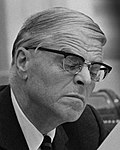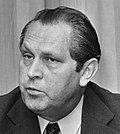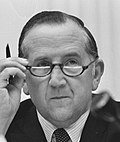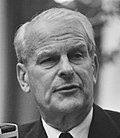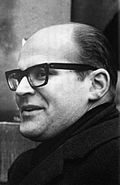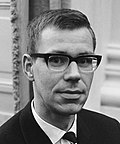De Jong cabinet
De Jong cabinet | |
|---|---|
52nd Cabinet of the Netherlands | |
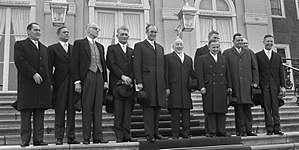  The installation of the De Jong cabinet on 5 April 1967 | |
| Date formed | 5 April 1967 |
| Date dissolved | 6 July 1971 4 years, 92 days in office (Demissionary from 28 April 1971) |
| People and organisations | |
| Monarch | Queen Juliana |
| Prime Minister | Piet de Jong |
| Deputy Prime Minister | Johan Witteveen Joop Bakker |
| No. of ministers | 14 |
| Ministers removed | 1 |
| Total no. of members | 15 |
| Member party | Catholic People's Party (KVP) People's Party for Freedom and Democracy (VVD) Anti-Revolutionary Party (ARP) Christian Historical Union (CHU) |
| Status in legislature | Centre-right Majority government |
| History | |
| Election(s) | 1967 election |
| Outgoing election | 1971 election |
| Legislature term(s) | 1967–1971 |
| Incoming formation | 1967 formation |
| Outgoing formation | 1971 formation |
| Predecessor | Zijlstra cabinet |
| Successor | First Biesheuvel cabinet |
| Part of the Politics series |
![Azure, billetty Or a lion with a coronet Or armed and langued Gules holding in his dexter paw a sword Argent hilted Or and in the sinister paw seven arrows Argent pointed and bound together Or. [The seven arrows stand for the seven provinces of the Union of Utrecht.] The shield is crowned with the (Dutch) royal crown and supported by two lions Or armed and langued gules. They stand on a scroll Azure with the text (Or) "Je Maintiendrai" (French for "I will maintain".)](http://upload.wikimedia.org/wikipedia/commons/thumb/8/8f/State_coat_of_arms_of_the_Netherlands.svg/150px-State_coat_of_arms_of_the_Netherlands.svg.png) |
|---|
|
|
The De Jong
The cabinet served in the final years of the tumultuous
Formation
Following the fall of the
After the election on 15 February 1967 the Catholic People's Party was the winner of the election even after losing 8 seats and had now a total of 40 seats in the House of Representatives. Incumbent Prime Minister Jelle Zijlstra was appointed as Informateur by Queen Juliana to start the cabinet formation process. After a first round of talks the Catholic People's Party, People's Party for Freedom and Democracy, Anti-Revolutionary Party and the Christian Historical Union agreed to form a coalition. On 6 March 1967, Queen Juliana appointed Vice-President of the Council of State Louis Beel (KVP), a former Prime Minister as the new Informateur to start the next formation phase.
On 9 March 1967 incumbent
Term
It was the first
Changes
On 7 January 1970,









Cabinet Members
- Resigned
- Retained from the previous cabinet
- Continued in the next cabinet
- Acting
- Ad Interim
- Medical leave of absence from 7 January 1971 until 22 February 1971
Trivia
- Six cabinet members had previous experience as scholars and professors: Johan Witteveen (Financial Economics), Carel Polak (Administrative and Agricultural Law), Gerard Veringa (Criminology and Criminal Law), Ferd Grapperhaus I (Fiscal Law), Klaas Wiersma (Civil Law) and Roelof Kruisinga (Otorhinolaryngology).
- Three cabinet members were flag officers: Willem den Toom (Lieutenant General in the Air Force), Joop Haex (Major General in the Army) and Adri van Es (Vice Admiral in the Navy).
- Eight cabinet members had served during World War II either in the military or the Resistance: Piet de Jong (Navy), Willem den Toom (Air Force), Wim Schut (Resistance), Marga Klompé (Resistance), Hans de Koster (Resistance), Joop Haex (Army), Adri van Es (Navy) and Bob Duynstee (Army).
- Four cabinet members (later) served as Party Leaders and Lijsttrekkers: Henk Beernink (1963–1967), Bé Udink(1970–1971) and Roelof Kruisinga (1971–1977) of the Christian Historical Union and Gerard Veringa (1971) of the Catholic People's Party.
- The age difference between the first Minister of Economic Affairs Leo de Block (born 1904) and his successor Roelof Nelissen (born 1931) was 26 years, 233 days.
References
- ^ (in Dutch) P. J. S. (Piet) de Jong 5 April 1967 – 6 juli 1971, Geschiedenis24, 9 December 2005
- ^ (in Dutch) De putschisten zijn onder ons, De Groene Amsterdammer, 28 October 2005
- ^ "Het succesvolle kabinet-De Jong 1967-1971" (in Dutch). Historiek. 28 January 2014. Retrieved 16 March 2018.
- ISBN 9789012087742.
- ^ (in Dutch) ‘De oorlog was de oorzaak van geduvel in ’68’, NRC Handelsblad, 10 May 2008
External links
- Official
- (in Dutch) Kabinet-De Jong Parlement & Politiek
- (in Dutch) Kabinet-De Jong Rijksoverheid







